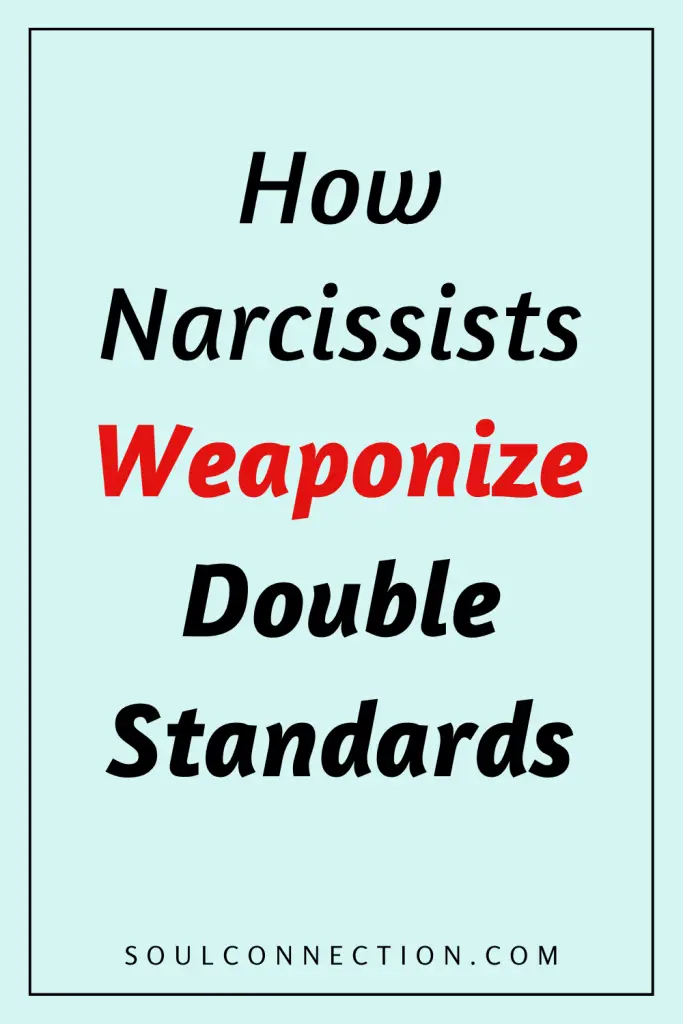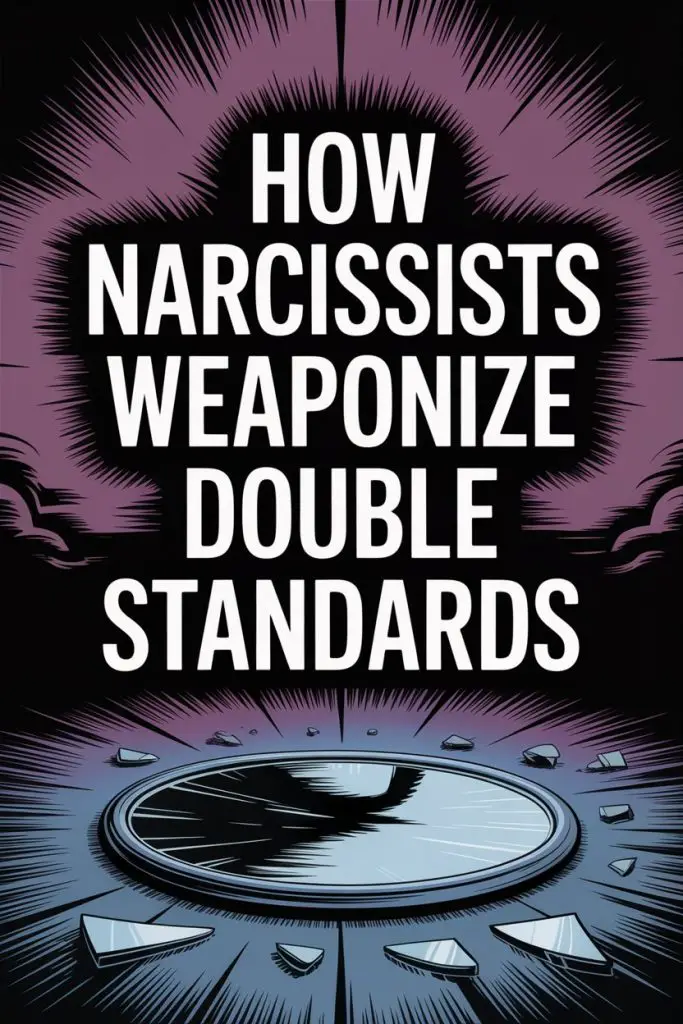When you’re involved with a narcissist, life becomes a game with shifting goalposts—and you’re definitely not the referee. You might start to wonder if there’s a secret rulebook you never got.
Spoiler: there is, but the narcissist edits it daily. Double standards are one of their favorite power tools, and spotting them early on can help you regain your footing (and maybe your sanity).
What Double Standards Look Like in a Narcissistic Relationship
Double standards, when wielded by a narcissist, go well beyond “I can but you can’t.” These are not your average run-of-the-mill hypocrisy moments. Oh no.
Narcissistic double standards are precision-engineered, booby-trapped policies designed to keep you second-guessing everything and them firmly in the driver’s seat.
They might demand honesty while spinning tales that would make a soap opera jealous.
They expect unwavering support for their ambitions, but when you need a cheerleader? Suddenly, they have a dentist appointment.
Rules? There’s a set for you (strict, no-bend), and a set for them (optional, frequently updated, barely recognizable as rules).
You begin to feel like you’re in a relationship with a customs officer who keeps moving the border.
Why Narcissists Love Double Standards
Control is the name of the game. Double standards serve as a silent whip, training you to stay on your toes while they lounge on a throne of their own convenience.
By keeping expectations lopsided, narcissists reinforce their superiority. If they’re always right and you’re always scrambling to meet shifting criteria, you’re too busy feeling inadequate to notice who’s actually causing the chaos.
This keeps your attention glued to their needs, rather than questioning the fairness of the whole arrangement.
Also, let’s not forget: drama is their natural habitat. These double standards keep things spicy (for them) and confusing (for you).
Recognizing the Signature Moves
How do you know when double standards are at play? Spotting the evidence is the first step to reclaiming your power.
Narcissists aren’t subtle about it, but it often takes a while for reality to click.
Examples might include:
- They can criticize you, sometimes brutally, but the minute you mention something they did (even gently), you’re attacked for being “negative” or “disrespectful.”
- Flirting with others is harmless fun for them, but if you so much as smile at the barista, expect a grilling.
- They expect you to pick up after them, manage their calendar, or remember their cousin’s birthday. Mention that you forgot the milk and you’re accused of being “selfish” or “inconsiderate.”
It’s exhausting. You start to question your own fairness, your memory, even your own decency.
Welcome to the narcissist’s funhouse of mirrors, where everything reflects back on you.
How Double Standards Erode Your Self-Esteem
The sneaky thing about double standards is how they worm their way under your skin.
Over time, the cumulative effect is brutal. You start to internalize the idea that you’re never quite enough, no matter how hard you try.
Small infractions on your part (real or imagined) are magnified, dissected, and used as evidence of your failings. Meanwhile, their missteps are minimized or outright denied.
This drip-feed of unfairness chips away at your confidence until you’re left apologizing for simply wanting respect.
Ever find yourself explaining basic decency to an adult? Or rehearsing conversations in your head, worried you’ll “set them off”?
That’s the narcissist’s double standard at work, rewiring your expectations of what’s normal.
Classic Narcissist Phrases That Reveal Double Standards
Words are weapons, and narcissists wield them like experts. Some lines are so classic they could be embroidered on a throw pillow (though I wouldn’t recommend it for your living room).
- “You’re too sensitive.” Translation: Any sign of discomfort with their behavior is your problem to fix, not theirs to examine.
- “Why are you making such a big deal out of nothing?” Translation: The things that bother you are illegitimate—only their feelings count.
- “If you loved me, you’d understand.” Translation: Your needs are less important than their whims.
- “I’m just joking. Can’t you take a joke?” But if you tease them? Outrage.
Hearing these on repeat can make even the most grounded person start to doubt their own reality.
Why Logic Doesn’t Work on Narcissistic Double Standards
Ever tried appealing to logic or fairness? You might as well be speaking ancient Sumerian.
Narcissists don’t use double standards by accident. These are not mere lapses in judgment; they’re strategic choices.
When you point out the hypocrisy, you’re likely to be met with denial, deflection, or even a dramatic counterattack. They might accuse you of being petty, or twist the facts so thoroughly you start wondering if you’re the one in the wrong.
It’s not that they can’t see the contradiction. They just don’t care—at least, not if admitting it would cost them their spot at the center of the universe.
The Emotional Whiplash of Shifting Rules
Nothing undermines emotional safety like unpredictability. Narcissists thrive on pulling the rug out from under you, just to see how you’ll land.
You might be praised for something one day, only to be blamed for it the next. Complaints about their behavior get repackaged as evidence of your “neediness” or “controlling” ways.
Your attempts to set boundaries are rebranded as selfishness.
This keeps you on edge, forever trying to work out the rules of engagement. Spoiler: the rules don’t actually exist, except to make sure you never quite get comfortable.
What You Can Do Tonight to Break the Cycle
Double standards lose their power when you refuse to play the game.
Start by tracking the inconsistencies. Not in a public spreadsheet (unless you fancy a row), but in a private journal or notes app.
Write down what was said, what was expected, and how things played out. Patterns will start to emerge, and that’s your reality-check.
Next, try this simple trick: When faced with a demand or accusation, ask yourself, “Would this be okay if the roles were reversed?”
If the answer is a resounding “No way,” you’ve identified a double standard. Congratulations, you’re already one step ahead.
Give yourself permission to name the unfairness out loud (even if only to yourself). Sometimes, articulating the double standard is like switching on a light in a dark room. You see the tripwires for what they are.
Setting Boundaries—And Sticking to Them
Setting boundaries with a narcissist is like building a sandcastle at high tide. Still, this is one area where practice pays off.
Keep your boundaries clear and simple. No long explanations, no justifying, no apologizing. “I’m not comfortable with that,” or “That doesn’t work for me,” are full sentences.
Expect pushback. They may accuse you of being unreasonable, cold, or selfish—classic projection.
Stick to your guns. Consistency is your armor. The more predictable you are about enforcing your limits, the less room there is for double standards to muddy the waters.
Sanity-Saving Self-Care While Living With Double Standards
Thriving (or even surviving) with a narcissist in your orbit demands extra self-care. After a day spent dodging double standards, your brain needs a break.
Find small rituals that remind you of your worth outside this relationship.
Catch up with friends who reflect your reality back to you. Schedule a walk, a bath, a binge-watch of bad telly—anything that fills your cup.
When your self-esteem takes a battering, topping it up becomes an act of quiet rebellion.
Don’t hesitate to reach out for professional support. Therapy isn’t just for “fixing” a problem. Sometimes, it’s for remembering who you were before someone decided the rules didn’t apply to them.
If You’re Ready to Call Time on the Double Standards
Leaving a narcissist (or even just stepping back emotionally) is easier said than done. Double standards can create an odd sort of attachment, where you’re always hoping fairness is just around the corner.
If you decide you’ve had enough, plan quietly and carefully. Reach out to trusted friends, pack any essentials, and keep your plans close to your chest until you’re ready.
Narcissists often ramp up the manipulation when they sense you’re pulling away, so a low-key exit is sometimes the safest option.
No matter what you choose, remind yourself: wanting mutual respect isn’t too much. It’s the bare minimum.
Rebuilding Your Sense of Fairness
Surviving double standards can leave you feeling disoriented, but it’s not a life sentence. Healthy relationships are built on consistency, not confusion.
If your gut is telling you something’s off, trust it.
Start with small acts of fairness in your own life—toward yourself and those who’ve earned your trust. Notice how it feels to be in relationships where rules apply to everyone, not just the chosen few.
Bit by bit, you’ll rewire your radar for respect and rediscover what it feels like to live by rules that make sense.
Leveling the Playing Field
Calling out a narcissist’s double standards isn’t for the faint of heart. It takes guts, clarity, and sometimes a healthy sense of humor to keep your bearings amidst the mess.
Every time you spot a double standard and refuse to internalize it, you’re reclaiming your space. You’re teaching yourself (and anyone watching) that fairness isn’t just a dream—it’s a basic right.
You may not change the narcissist, but you can change how much power their shifting rulebook has over your life.
And that’s a win worth celebrating—no exceptions, no double standards.


